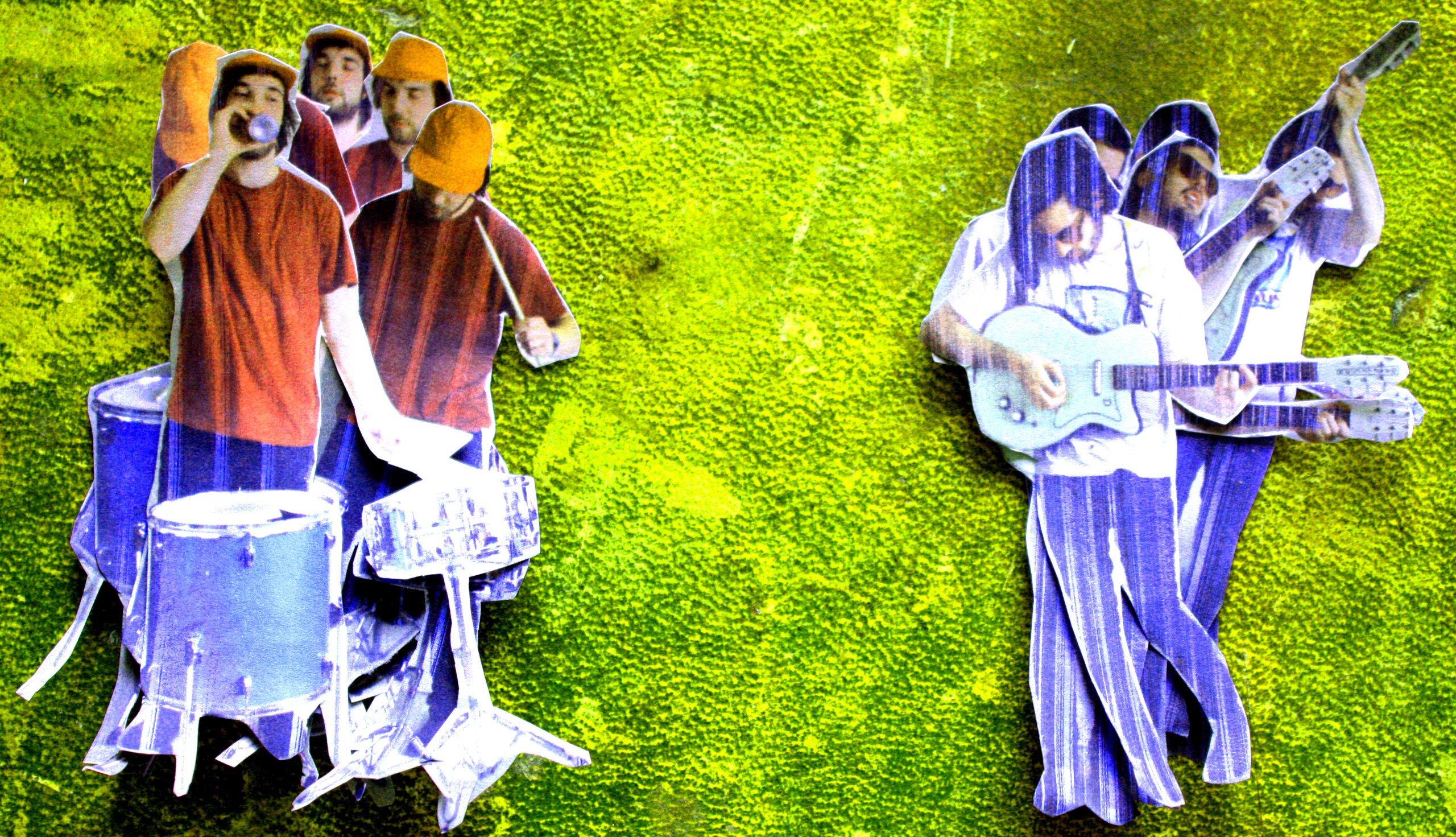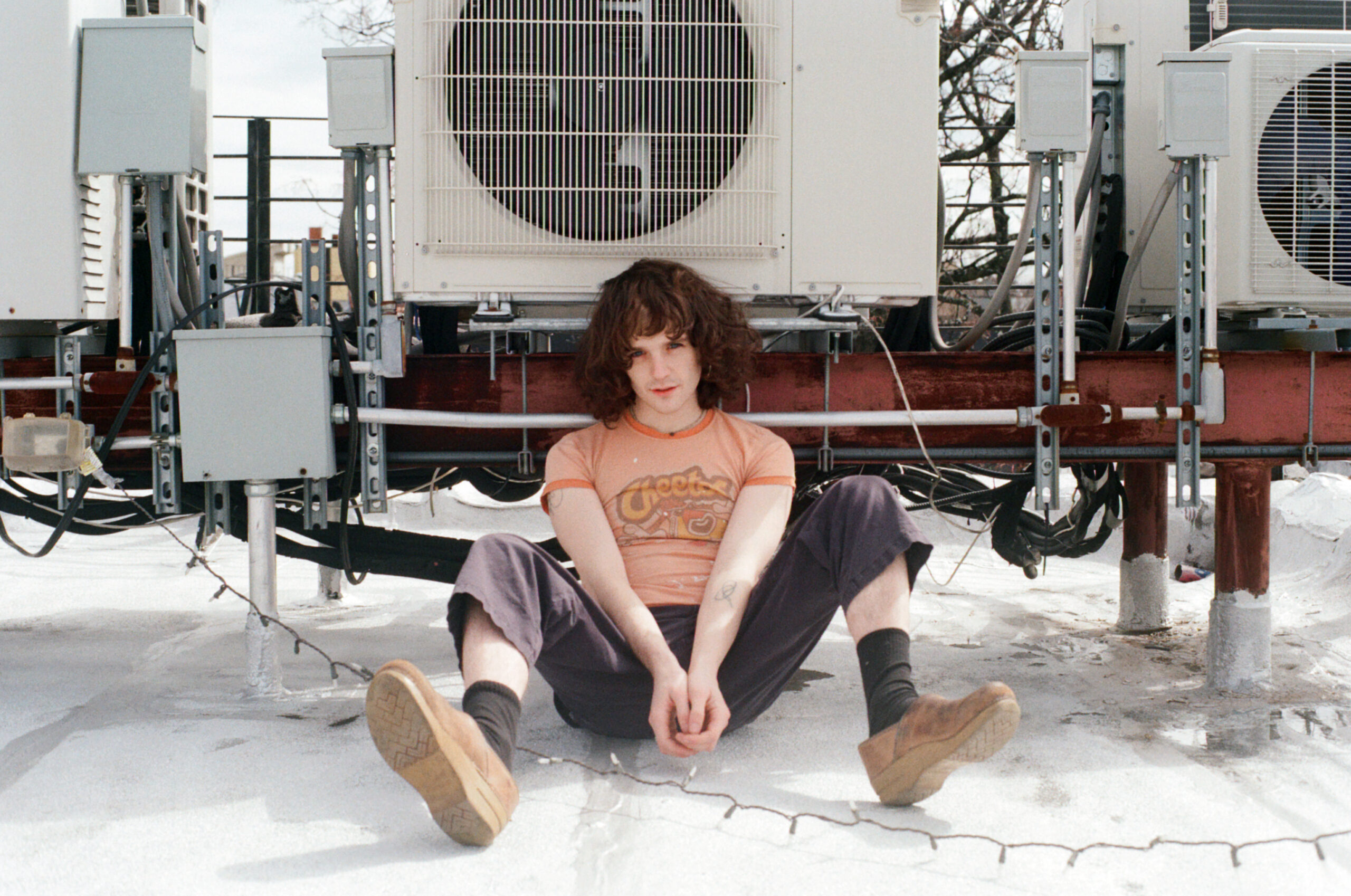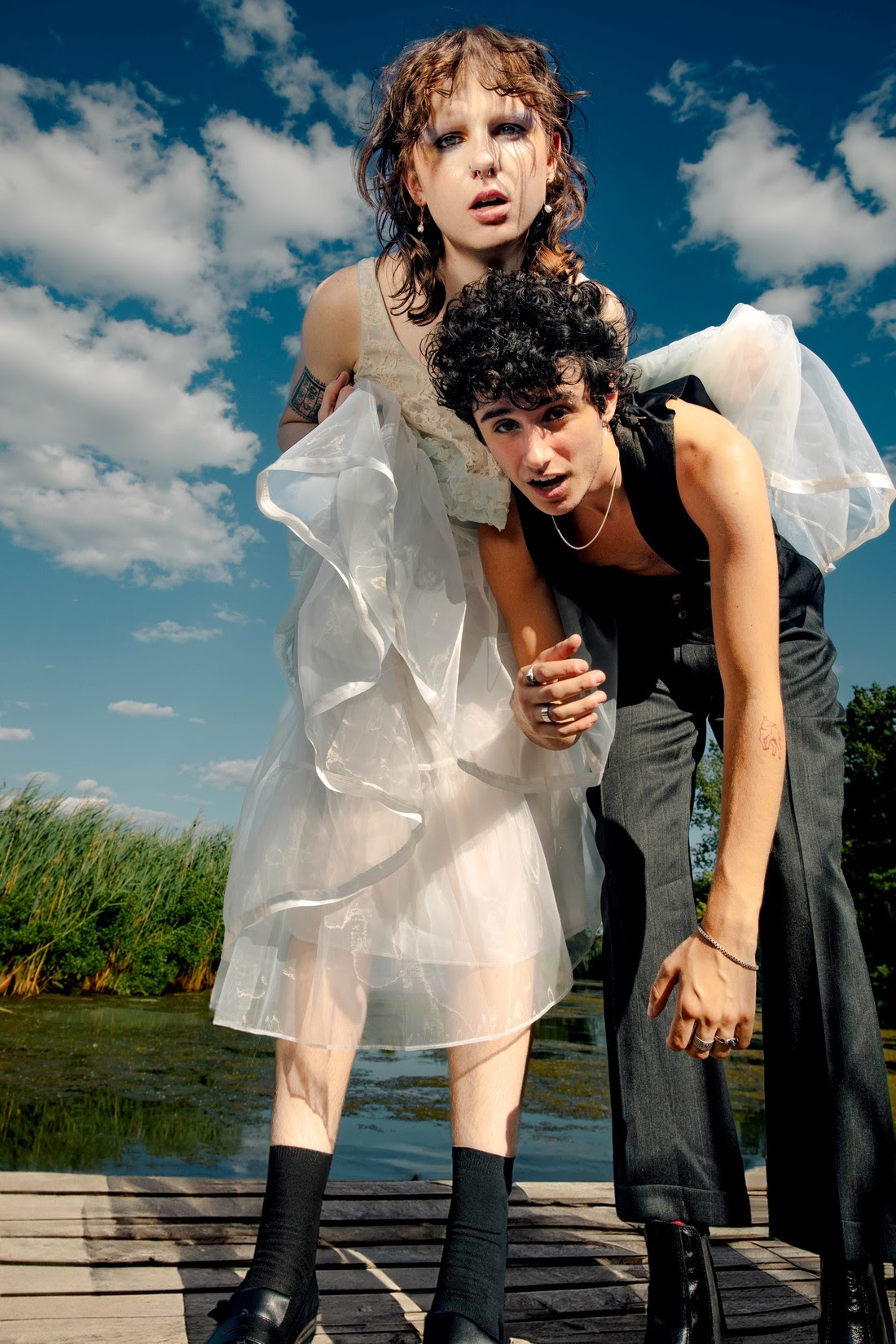British cousins Chris Barrett and James Barrett comprise the scrappy Bristol-based indie-rock band Something Anorak. Last month they released their debut album, Tiny Island, which sounds like '90s Radiohead might have sounded if they'd operated with the low budget and self-imposed restrictions of the indie-pop scene. The music veers from murky, minimal ballads to ragtag rock catharses deployed with a crushing heft. Chris, the frontman, often emotes with a piercing falsetto that sounds gentle in the band's quieter moments and ferocious when they let 'er rip. Impressive guitar work and thunderous drumming abound. It's a special kind of lo-fi record, one where the deft melodic touch doesn't get in the way of rocking the fuck out.
Tiny Islands is a pleasant surprise, especially given that Something Anorak hail from Bristol, a city best-known for its legacy of trip-hop and electronica acts such as Massive Attack. But the city has been generating a number of exciting guitar-based acts lately including Trust Fund and Oliver Wilde. So count Something Anorak as part of some New Bristol Sound, if you like, or just include them among of the growing number of exciting young bands worldwide lending some fresh verve to a classic indie-rock aesthetic. They were also enjoyable conversationalists when I Skyped them a few weeks back to chat about their album, their adopted hometown, our competing definitions of the term "Anorak," and more.
STEREOGUM: You're cousins, so have you been playing music together for a long time?
CHRIS BARRETT: For a couple of years, on and off. But we have been in different bands throughout that time. And then at the start of this year is when we really started Something Anorak in this way. Officially we have only been doing the band for about a year, but we have been making noises together for about four or five years.
STEREOGUM: I thought it was pretty bold to basically name your band after a genre.
CHRIS: A genre?
JAMES BARRETT: It wasn't really after that to be honest, it was really a random choice of band name.
CHRIS: What's the genre? I've never heard of an anorak genre.
STEREOGUM: Some people use anorak as a synonym for indie pop or twee.
CHRIS: Oh, I see. I'll have to look it up. Maybe we sound exactly like those bands without even knowing it.
STEREOGUM: I'm looking it up now, and I see that over there in Britain "anorak" is slang for an obsessive person.
CHRIS: Yeah, it's actually a raincoat as well.
STEREOGUM: We're all learning new things today! One thing that appeals to me about the record is that your songs seem to vary between two extremes. You have your chill, really quiet songs, and you have your songs that are pretty loud and heavy for a two-person band. Do you guys intend for it to be polarized like that? How do you develop that dynamic?
CHRIS: We want to be as dynamic as possible, really, within the constraints that we have, which is one guitar, a broken-down drum kit -- we don't use a full drum kit -- and a Casio keyboard. So instrument-wise what we can offer is very simple, so the dynamic comes from the songwriting. When we were planning to record the album, we were thinking a lot about how we wanted the album to flow and how the loud, quiet, loud, quiet wouldn't necessarily be in songs individually but in the album. So you'd have loud then quiet. I don't know, a lot of my favorite albums have that kind of ebb and flow, it's quite endearing. It keeps you interested, I think, when you know the next song isn't going to sound the same as the last song. If we can create those polar opposites with just the two of us, then that's great and really exciting to us.
STEREOGUM: I've only experienced you by listening to the record, but I imagine it's harder to pull that off in the live setting with only two players.
CHRIS: It depends. If we are on a bill which is primarily more of a loud bill with other loud bands, then we will kind of stick to the loud songs I guess. We wanted to the album to be as live-sounding as possible. We tracked it in a day with our producer, who was in a band we went on tour with. So he knew our live sound through and through and kind of shared the same vision as us when it came to recording it. We try and emulate that in our live shows. We try and keep it raw and simple. We try and play all the songs off the album pretty much, so there is going to be that dynamic.
[videoembed size="full_width" alignment="center"][/videoembed]
STEREOGUM: That rawness definitely does come across in the recording. It's not too cleaned up. Sometimes the transition from live to record can end up smoothing out the songs too much, but it's not that way at all.
CHRIS: It's really nice to hear that. That is something we were really keen to capture in any way, and being there is just two of us, there is no bass on the album, there is no bass drum on the album. Our producer, Hugo Bishop, is really good at mixing and making sure that the songs have that same punch that they do in a live setting.
STEREOGUM: Tell me about the constraints. Are you intentionally omitting the bass drum and all that?
CHRIS: Yeah. I mean, I've been in bands -- we have both been in bands -- where there are lots of instruments and lots of people. And it can be quite heavily political being in a band of lots of different people, and a logistical nightmare playing shows.
JAMES: Yeah, it can.
CHRIS: So part of it was like because we are lazy and wanted to make it as simple as possible. And we definitely imposed those constraints as a way to kind of be creative in a different way -- you know, "Here's what we got. Let's see what we can do with this."
JAMES: I definitely came out of the last band we were in and, I don't know, just working with a limited setup you have to delve somewhere deeper. It's not like you have the array of equipment and you can be like, "Oh, let's try it and see what is sounds like on this and that." It's just like you have these limited tools in front of you, so now it's like you have to experiment with just this.
STEREOGUM: You mentioned some of your previous bands. Have you guys been working in a similar style previous to this, or is this a new direction for you?
CHRIS: We were in a band previously together, which was a much more sort of experimental, conceptual band. And then I was in a weird electronic band, and he was in a folky, kind of chamber pop band. So this is kind of new for us, like doing some of the songs on the album where there is real heavy stuff -- the kind of, I don't want to say "grunge," but that kind of vibe -- isn't stuff that we've necessarily tread before. It's kind of new in that sense.
JAMES: It's definitely the kind of music that we listen to. I suppose like with this more than any other band I've been with before we are doing the music that we want to create and enjoy that feels right to us and that we have listened to for as long as I can remember. That's how it feels, anyway.
STEREOGUM: You mentioned your producer Hugo is from Oliver Wilde. It seems like there is a really strong scene in Bristol right now. I know we have posted some of the Oliver Wilde stuff, and we premiered a couple Trust Fund songs recently as well.
CHRIS: Yeah, we've only been in Bristol for essentially a year. But we've kind of been aware of the resurgence of guitar-based music that's been happening in this city -- because obviously it very much has a history of electronic music, and that's still very much a big thing here. But there are a few people, a few small labels like Howling Owl, the label that put out our record, and a few others like Trust Fund and Oliver Wilde's. They're getting a lot more exposure, not just in the city but globally as well. I know Trust Fund has done really well. Galpals has done really well. There is definitely a buzz about the place at the moment, and it feels good to be making music at the moment, which is cool.
[videoembed size="full_width" alignment="center"][/videoembed]
STEREOGUM: How did you end up in Bristol?
CHRIS: We were both studying at university in Cornwall, which is right at the bottom western tip of England, and we were originally from a place called Essex, which is right outside of London. So once we graduated down in Cornwall, we were kind of were looking to make the move back east and locate ourselves in a city. Because Cornwall is very rural, so we were kind of after a bit of grime and just the culture and the buzz about a city. Bristol just loves its music, it loves its art, it's relatively cheap to live compared to London for a start. It's pretty central in the country, it's easy to get to Manchester, London, Brighton, all the kinds of places we would be looking to play shows. So it kind of felt like a natural step, I guess.
STEREOGUM: Your song titles are really fascinating. Do you notice certain themes coming up repeatedly in your music?
CHRIS: They are all sort of narratives based on my own experiences up until this point, whether that be stuff that has happened to me directly in my life or stuff that I have observed happen to other people. It's always done in a kind of abstract way, I guess, the message. I like the idea of people being able to perceive words in their own way and take from it what they will and come to their own conclusions, instead of being told, "This is what this song is about, that is what that song is about." But yeah they're all kind of loosely based around stuff that has happened to me. I don't know how obvious it is to the listener or whether that is important either. I don't even know if it is necessarily important that you can fully hear the lyrics. You know, some of my favorite songs, I have no idea what the people are saying.
STEREOGUM: Have you played outside of the UK yet? Are there plans to do that?
CHRIS: Oh, we would love to. Next year is definitely the year that we are working on putting shows together. Primarily the UK. I mean earlier this year we toured around the UK. We want to put together another UK tour at the beginning of next year, and if somewhere down the line we can go to Europe or even the States, that would be amazing. But it's just baby steps I think. But who knows? We are just waiting for the call, I guess.
STEREOGUM: Your album just came out, but do you have any more releases coming up?
CHRIS: Well there are no sort of physical releases as of yet, but we are going in to record our second album in February because that is already written and ready to go. We set aside like a week because we like to do everything when recording; like I said we recorded this album in a day, so I think a week is good enough time to lay down a second album. The plan is to try and get that out as soon as possible. We admire bands who are prolific in their releases, and it seems that these days it has become a lot easier for artists to do that instead of sit around for two years with different commitments to labels or tours or whatever. They can just put out. Thee Oh Sees and Ty Segall do that, and Parquet Courts have managed to do that and be a pretty big indie band at the same time. So that's what we want to do. We want to put it out by next summer, hopefully, if someone will put it out for us.
//
Tiny Island is out now on Howling Owl. Buy it at Big Cartel or Bandcamp.






